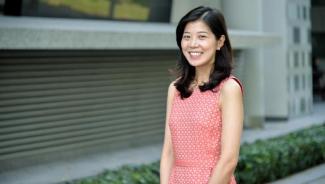
SMU Assistant Professor Holly Yang studies corporate disclosures, a practice whereby companies provide earnings forecasts to guide investors and stock market analysts.
Back to Research@SMU Issue 19 (Oct 2014)

Photo Credit: Cyril Ng
By Yamini Chinnuswamy
SMU Office of Research (10 Oct 2014) – Popular perceptions of accounting tend to revolve around debit, credit and financial figures. But as Assistant Professor Holly Yang from the Singapore Management University (SMU) School of Accountancy points out, the fundamental role of accounting is to provide information to investors and the public, and to reduce information asymmetry between a given company and everyone outside of it.
“In accounting, much of what we study are corporate disclosures that firms provide. These comprise forecasts of their earnings for a given quarter or fiscal year,” she explains. Professor Yang, whose research explores the mechanisms of these disclosures, is intrigued by the fact that they are provided by companies voluntarily.
“There is no rule that says firms have to share their earnings per share for the next fiscal quarter or year,” she says. “But firms end up doing so because there is a demand for these information—such as from analysts who are trying to forecast earnings to provide investment advice to clients or the public. With voluntary financial disclosures, companies can provide a range to guide these analysts, so that they are not too far off with their stock market predictions.”
A treadmill you can’t get off from
Companies in the United States have a long tradition of sharing such predictions, shares Professor Yang, who completed her doctoral degree at Cornell University in 2009. She explains that such mature disclosure culture is the result of a very developed capital market due to a dense analyst population in Wall Street that is constantly demanding information from publicly listed companies.
Moreover, the act of providing disclosures tends to be a habitual one, she says. “Once a company provides projections for one year, they feel obliged to do it the following year as well. Otherwise, people will start to assume that something bad has happened and that the company is trying to hide it. It is like getting on a treadmill you cannot get off from,” she adds.
Even so, firms in the United States have begun to oppose the practice of voluntary disclosures, notes Professor Yang. She shares the example of Coca-Cola, which discontinued its quarterly profit forecasts in 2002 due to concerns that a myopic focus on such projections was distracting from the company’s long-term performance.
Instead, companies in the United States (US) have now started to provide Wall Street with other forms of less precise disclosures. “Instead of saying that their earnings per share are going to be such and such, they might just comment if it is good or bad news, or if analyst expectations are in line with theirs,” she explains.
In contrast, disclosure cultures outside of the US are not as developed—a challenge for Professor Yang as she expands her research to include the international community. But she expects this to change with increasing capital inflow into emerging markets leading to an eventual rise in voluntary forecast sharing by companies.
“As markets continue to mature in countries like Singapore, there will be an increasing demand for information by investors and analysts who begin to seek transparency from the firms they are investing in. Companies will then need to provide more information to satisfy this demand.”
At the same time, Professor Yang warns that companies will need to learn from the examples of their counterparts in the US and be careful about setting precedents which they are unable to shake off.
Marrying economics with psychology
Earlier on in her career, Professor Yang delved into the roles played by company leaders in the voluntary disclosures system, and how their individual philosophies could contribute to a company’s credibility.
“The analyst community eventually figures out if there are certain managers they can rely on for accurate projections,” she notes. “Take for example General Electric’s former chief executive Jack Welch who was known for providing guidance and being able to beat forecasts. Analysts and investors are more inclined to feel confident about the projections of such managers, and in investing or continuing to invest in their companies. This builds credibility for such firms.”
One of Professor Yang’s other studies, which will soon be published, brings psychology into the field of studying individual managers’ philosophies towards disclosing financial forecasts.
“In assuming that everyone is rational, traditional economics disallow a role for individual biases. But it is a robust finding in psychology that individuals tend to over-estimate their abilities, though of course this varies across cultures,” she says. “One of my challenges has been to measure this individual trait in managers, and to tie a link between their behaviour towards sharing predictions and the accuracy of their predictions.”
Noting that there are potential synergies with fellow faculty across SMU, such as the School of Social Sciences, Professor Yang adds that she has plans to collaborate with her SMU colleagues to expand her foray into the psychology of accounting.
Social media to change corporate disclosures
Professor Yang anticipates that the future of company forecast declarations lies in social media. “In the past, when it came to the topic of disclosures, we would think of financial statements or earnings forecasts,” she says. “These days, however, almost all companies and their leaders are either on Twitter or Facebook.”
But she is quick to add that making disclosures through social media can be a dangerous road to take. “For example, in the US, the CEO of Netflix prematurely disclosed the company’s performance through his Facebook account,” she says. “Handling disclosures through social media will be a challenge for companies to navigate, but from a research perspective, it will be interesting to exploit, especially in an international setting.”
Back to Research@SMU Issue 19 (Oct 2014)